Viewpoint
We can fix Los Angeles: The people of this city can and will come together
I have the plans, the experience, the leadership, the support, and the passion.
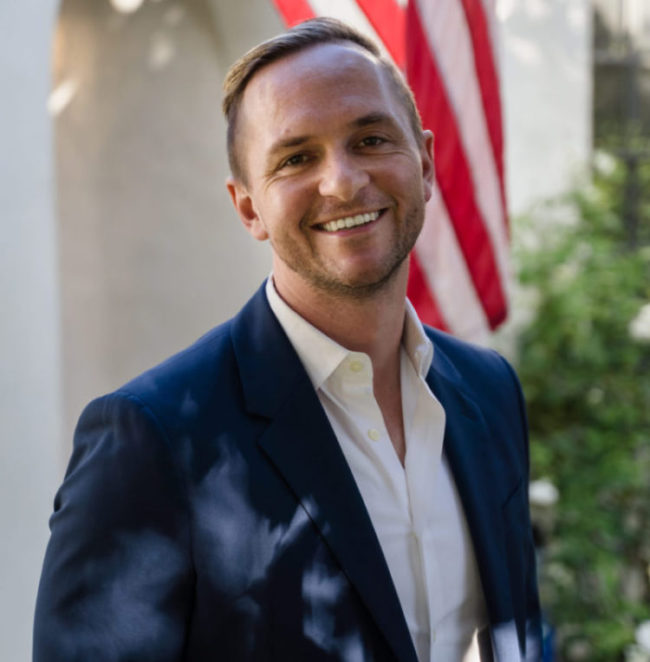
Editor’s note: The following essay is written by a mayoral candidate seeking the office of the mayor of the City of Los Angeles. The essay is an independent viewpoint published by the Los Angeles Blade without endorsement and is additionally not a paid political advertisement.
By Los Angeles Mayoral Candidate Craig Greiwe | I have been thinking a lot lately about what it means to run for office in America.
You see, when I started running for Mayor of Los Angeles in late 2021, I had an idea about what it meant to serve my city.
I had real, concrete plans; in fact, the only published plans of any candidate. I had experience in leadership, both in business and in nonprofits. I had a successful career and track record of bringing solutions to seemingly impossible and complex problems of all sizes. I had a full campaign team of experts. I had a message that resonated with people, and which still does: Knowing that the people who created our problems cannot be the people who solve them.
Above all else, I had passion. The kind of fire-in-your-belly, true-believer passion that makes you wake up early and go to bed late believing that no matter how bad things seem in this city, they can and will be better.
We can fix Los Angeles. The people of this city can and will come together to choose change based on common ground and common sense. I had all these things, and still do, proudly. But I did not have the experience of what we expect of people to become a public servant.
The last four months, along with my life experience, have taught me that everything I read about, everything I knew from advising other candidates, everything I learned from building the fastest-growing grassroots movement in the city — all of it was informative, educational, redeeming, challenging, and impressive, and very much not enough.
It has also taught me that I am ready to be the next Mayor of Los Angeles.
I have the plans, the experience, the leadership, the support, and the passion. I have also realized that what we expect of people to become Mayor, or City Councilmember, or even Block Captain, may be what is tearing Los Angeles, and this country, apart. The way we hold our elections is not just part of the problem, it is the problem.
I did not grow up wanting to be a politician, or in politics in any capacity. Growing up the way I did, public service was not even on the map. I was too busy running from work to school and back again in an effort to survive to be able to think about changing the world. I grew up poor, dirt poor. The kind of poor where you cannot afford shoes and where you must forage in the forest for food. Today, hipsters think it is kitschy and fun. To me, it was necessary to live.
Things got worse when I was abandoned at age 14. I was left to fend for myself and faced the type of impossible questions that no one should ever confront, and yet all too many people have to. I had to figure out life on my own, without parents, even bad ones, and always just a knife’s edge away from homelessness and starvation. Only through determination, hard work, and helping hands from other people did I find a way out. And along the way, I learned that every decision mattered. What I did in the morning, what job I took, what too-quick-turn that caused a flat tire I could not afford, it all mattered. It was the difference between a roof over my head and hunger pains at night.
Though I would grow up and emerge from poverty to become a successful business leader and executive, I never lost the feeling that every decision mattered. If anything, that is why I became successful in my job. Some of America’s most trusted corporations and individuals, from Verizon and the late Kobe Bryant, trusted me to lead strategy and business operations because every decision always mattered, and I usually made the best one for them based on exhaustive research, common sense, and a deep understanding of every issue and alternative.
In late 2019, I approached the crises confronting Los Angeles with the same rigor I did my client work. I wanted to help the city that I loved, the city with the only friends and adopted family I had ever known. After extensive research and interviews, I discovered that we had a ruling class that no longer responded to the people they were supposed to serve.
Eric Garcetti was elected Mayor with just over 200,000 votes in a city of four million people. Elected city officials were just on a carousel of personal ambition with lifetime pensions attached. The vast majority of the people in this city did not vote or even know who represented them, and the vast majority of elected officials preferred it that way, as they pilfered from the public – three indicted city councilmen in under 20 months is just the start – and built-up power that surpasses that of any other local official in America.
My research also led me to see an opportunity that, because of a date change in our city elections, we would have a once-in-a-lifetime chance to bring real change. Our citywide elections, including Mayor, would align with federal elections for the first time, sending turnout soaring by 300 percent. The ballot box would be flooded with new city voters who could overwhelm the ruling class of Los Angeles by sheer volume. All they had to do was believe it was possible, something they did not yet do.
As a result, I created Rise Together, a grassroots organization focused on common ground and common sense. We worked to shift the public narrative and succeeded. When we started our messaging campaign, more than 75 percent of Angelenos did not believe change was possible. Within six months that number had dropped to under 38 percent thanks to our work to accelerate a desire for change already underway in the city. Candidates in almost every race began using, if not copying, our organization’s language, and self-identifying their affinity for common sense. We amassed a movement of over 100,000 people.
There was just one problem: No one in the Mayor’s race was focused on that change or common sense. Every leading candidate was a career politician, and the remaining expected candidate who later declared, has also been a career insider for more than 30 years, though unelected.
I faced the daunting reality that if no one did anything, all our work to bring change to this city would be bulldozed by a more-of-the-same Mayor. So, I made the difficult decision to step away from Rise Together to run for office – something I had never in my life wanted to do.
It was not a decision I took lightly. I did more than 2,000 interviews, meetings, and calls with folks around the city. I digested over 100,000 pages of research. I wrote exhaustive, real plans to address our crises, and lined up experts and supporters in every field who could support the campaign and our movement for change. We mapped a clear, if hard, path to votes and victory, in spite of the millions of dollars we knew institutionalists would spend trying to paper over their own failing records. I became a candidate for Mayor of Los Angeles.
Almost immediately, however, I realized that being ready to be Mayor, as I was and am, had nothing in common with being ready to be a candidate. It was not the mean tweets; my clients had taught me not to fear or care about basement bloggers simply hoping for a big break with salacious rumors and lies. It was not the endless fundraising calls, which I took as an opportunity to talk with voters, something I loved. It was not the 18-hour days or the endless events, all of which filled me with energy and passion, seeing the look of inspiration and hope in people’s faces. Those things, I was ready for.
What I did not expect was the combination two factors in a perfect storm. First, the willingness of those in power to do anything to stay in power and, second, the public’s willingness to stay disengaged.
First, the power. One candidate sent a surrogate to ask me to drop out of the race in exchange for becoming Deputy Mayor and designated successor, as if the office was something that could be doled out like party favors. Not one, but two leading reporters told me that they would not cover me or mention my name because, substituting their judgment for the public’s, they felt I “should not be a candidate” because I had not “followed the rules” to get a Commission seat or run for smaller office first.
Those who have governed this city, lobbied this city, run elections, and even marched in parades lined up, one after the other, to explain to me my candidacy was not credible. Their reasoning? Because I was not a current elected official or billionaire willing to pump endless money into it. No matter how many supporters I had, or how much money I raised, they would continue to ignore me, hoping to strangle my outsider candidacy, and its threat to their world order, on the vine.
All of this coalesced in a recent Mayoral debate. A seemingly respectable university, Loyola Marymount, allowed a professor moonlighting as a paid lobbyist to control and manipulate their debate. He, too, tried to silence me because I “should not be a candidate”. Hundreds of citizens wrote to Loyola Marymount to advocate for my inclusion, including civic leaders with strong consciences.
Yet others did not. Three organizations who represent the LGTBQ community in politics refused to publicly advocate on my behalf for fear of alienating favor with a leading straight candidate (so much for community!). Three former elected officials said they believed my exclusion was “abhorrent” but there were challenging “political circumstances” that prohibited them from speaking out in spite of their principles. Loyola Marymount buried its head in the sand.
All of this, for what? To prevent me from speaking on a single debate stage? To prevent an honest exchange of ideas? What do these institutionalists, the elected officials, and their staffs who have governed this city for decades of failure, have to fear from an outsider that, by their own attacks, they claim is not credible? Every voter should find an answer for themselves.
And I hope that they do. Because the second, and most trying circumstance of being a candidate, is the voter and their apathy. When I declared my candidacy, I believed and still do — that the voters here care about their lives and making Los Angeles a better place. They know that this city has gone from being a place that serves its people to one that breaks them down. They know that we cannot trust the people who created our problems to be the same people who solve them. They can look out their windows, no matter how many ads my opponents run, and see the track record of failing leadership in their streets. I believe in the people of this city, every day. Even when they challenge me not to.
Every day, I talk to dozens of people who say they “do not want to get involved in politics” even while they complain about the homeless on their block. They are focused on the dangers of a neighborhood encampment, not looking down the road far enough to see we have the chance to end all encampments while housing all the homeless in a comprehensive plan. They listen to my speech in a town hall or zoom meeting and applaud. They say they will vote for me, but they cannot bring themselves to share a social post or forward an email to a friend. They take action in their heart, but not with their fingers, feet, or wallets. So many people in this city want change, but they have not yet decided to make the very choices that can and will bring about that change. It is almost enough to be maddening. Combined with the malfeasance of the ruling class of this city, it makes it almost impossible to run for any office, including Mayor.
So why do it? Because I still believe. Every day shows me that for every ten people I talk to who aren’t willing to take the plunge, there is one who is willing to do it ten times over. There are people so fed up with career public parasites, they are willing to go to the mat every day. There are people so hurt by this city that, even though they can barely afford to make their rent, they donate $25 to my campaign because they believe in me and my message of change. I still do it because I’ve met and spoken to thousands of people, and I know that those people can eventually bring the rest of the city along…and I choose to believe they will.
You see, being a candidate is different from being Mayor. I am ready to be Mayor. I am prepared. My plans will solve our problems. But being a candidate has nothing to do with that. Running for office requires me to battle the most corrupt institutions and individuals of one of the most corrupt cities in America. Which I do every day. But it also requires me to believe that a noble corps of a few thousand can wake the sleeping giant public of this city and rouse them into action.
It is a huge bet. I have staked my life on it, as the only candidate not taking a paycheck for another job while running for Mayor, which is a terrifying thought for a poor kid from the sticks. But it is a bet I have to place. The future of this city depends on it. It depends on me, and you, believing that the people of this city will rise from their slumber, make the hard decision to look past fancy slogans, and multi-million-dollar ad buys to choose the only outsider in the race, the only real plans, the only path forward out of our crises.
That is what it takes to run for office in Los Angeles. It is grueling, grinding, and generally near impossible. However, my entire life has been making the impossible, possible. And it is the hope of the thousands of people I have met, and the thousands more I will meet, that keeps me going. I choose to believe, because believing is the only way that this city, and this country, survive. That is what I see when I think about running for office in America.
Viewpoint
From closeted kid to LGBTQ+ journalist: queer community is my guiding light
Ponderings about my first months at the Blade and the stories shaping my reporting.
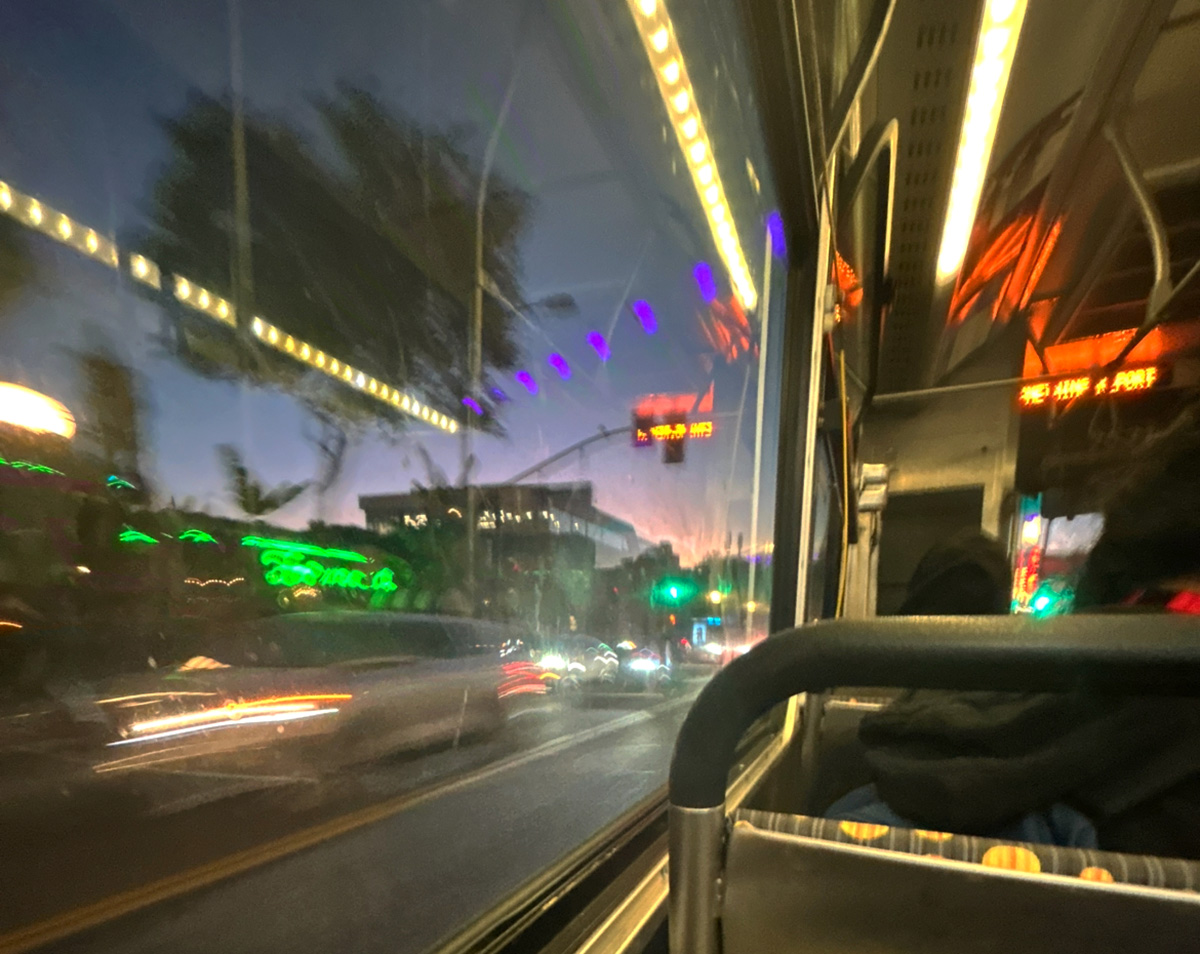
In the first week of September, I boarded an early Coast Starlight, crying quietly over a cold bagel as the train departed. It was a 12-hour trip from Emeryville to Los Angeles: plenty of time, I thought, to steep in my sadness as I left the home I had made for the last several years to start a new one in a bright, shiny city. I sat in silence, watching the sun press itself into the sea off the Santa Barbara coast, water and night parting me further and further away from my friends and community.
When I arrived at Union Station, I stood at the platform and was surprised by how warm it was at 9 p.m. A giant skyscraper towered into the sky, glaring down at me with its golden glow and millions of windows. Welcome home.
Since then, I’ve made a truce with the city. I’d always been in its orbit, having grown up in a small, suburban town northeast of it most of my life. But trips into L.A. proper were reserved for special occasions: birthday dinners in Little Tokyo at our favorite restaurant, the now-defunct Sushi Komasa. I had never ventured into the region’s vast queer gems and safe havens: places that I’m sure would have provided me assurance that it was okay to have crushes on people who weren’t boys (or to not have crushes at all!).
As a computer kid, I subsisted on brief explorations on YouTube or clicking through various fanfiction forums. My queerness existed in the gay kiss scene of Cruel Intentions, reigniting with each press of the “play” button and shelved away when the tab closed. I operated like this for years, burying my desires and performing diligent, dependable elder child during the day.
Today, I’m a community reporter at a proudly LGBTQ+ news outlet, where I get to spend most days with other queer folks, listening to their stories and trying to document their lives.
In the last few months, I’ve attended parties, press conferences, community gatherings and rallies that center the liberation of queer folks, specifically those who are multiply marginalized. I’ve spoken with strong leaders and advocates for the TGI movement, who fiercely advocate on a daily basis for greater protections for transgender, gender nonconforming, and intersex people.
One of my most joyous reporting moments at the Blade includes attending the Los Angeles LGBT Center’s annual Queerceañera: where beloved drag diva Lushious Massacr floated across a stage, embraced by the love of her community as she celebrated and reclaimed the coming-of-age ceremony. With queer joy and communal love, she transformed into a beautiful, cascading butterfly on the precipice of flight.
I also attended a transformative HIV/AIDS art exhibition curated by Anuradha Vikram, where a small gallery morphed into a living archive of revolutionary activism spearheaded during the HIV/AIDS epidemic of the 1980s. The intersections of history and art, and the unity amongst various queer people during this period, were truly inspiring to witness. Speaking with Vikram was instrumental in my early days at the Blade, and our conversation made me think critically about the ways queer activism has shifted dramatically in the decades since the HIV/AIDS epidemic.
How are young, queer people channeling their activism today? This is a question that continues to power my work as I report on our communities.
Another valuable and crucial experience I had while working at the Blade was on World AIDS Day, where I covered a reading by the APLA Health writers group. Dozens of us stood by the pillars of West Hollywood’s AIDS monument and listened to the beautiful, moving prose of several writers who all had personal ties to the HIV/AIDS crisis of the 80s. I still think about John Boucher’s gorgeously crafted, heart-wrenching story.
“I remember Rex coming through our front door after a trip, coming home from work, or at 2:30 in the morning after the bars had closed and he’d finished singing karaoke. As the black lacquer door opened into the goldfish-colored room, he’d sing: ‘Hello apartment,’ Boucher read. “He was greeting our life. His tenor voice was clear and true, his eyes the color of cornflower blue against the pinkish orange sunset of our living room. This is home.”
These stories, rendered through the heartfelt voices of the people around me, remind me of the importance of this work. I struggled with my identity for most of my adolescence and early adulthood, and only began to really accept and understand myself around four years ago, when I began to develop blossoming friendships with queer people who were unabashed about their art, their euphoria, their juicy crushes. Their visibility and their joy, which became our shared visibility and joy, guide me in my most difficult moments.
This year, I suffered the tremendous loss of a dear friend who was a blazing, warm light for her community. She was a poet and artist who was outspoken in her activism and in her bold self-expression. She rejected shame with every fiber of her effervescent being and advocated for the protection of fellow trans women, disabled people, and queer people of color. Her loss is one I will carry with me forever, and anchors me in my work.
My work is for Mercedez, my queer AAPI siblings, queer youth, queer immigrants, queer disabled people, and everyone else who exists on our vast spectrum.
Commentary
The Westside is unaffordable. Allowing for more housing can help
Three young Westside elected officials call for urgent action to fix our housing shortage—and make room for the next generation.
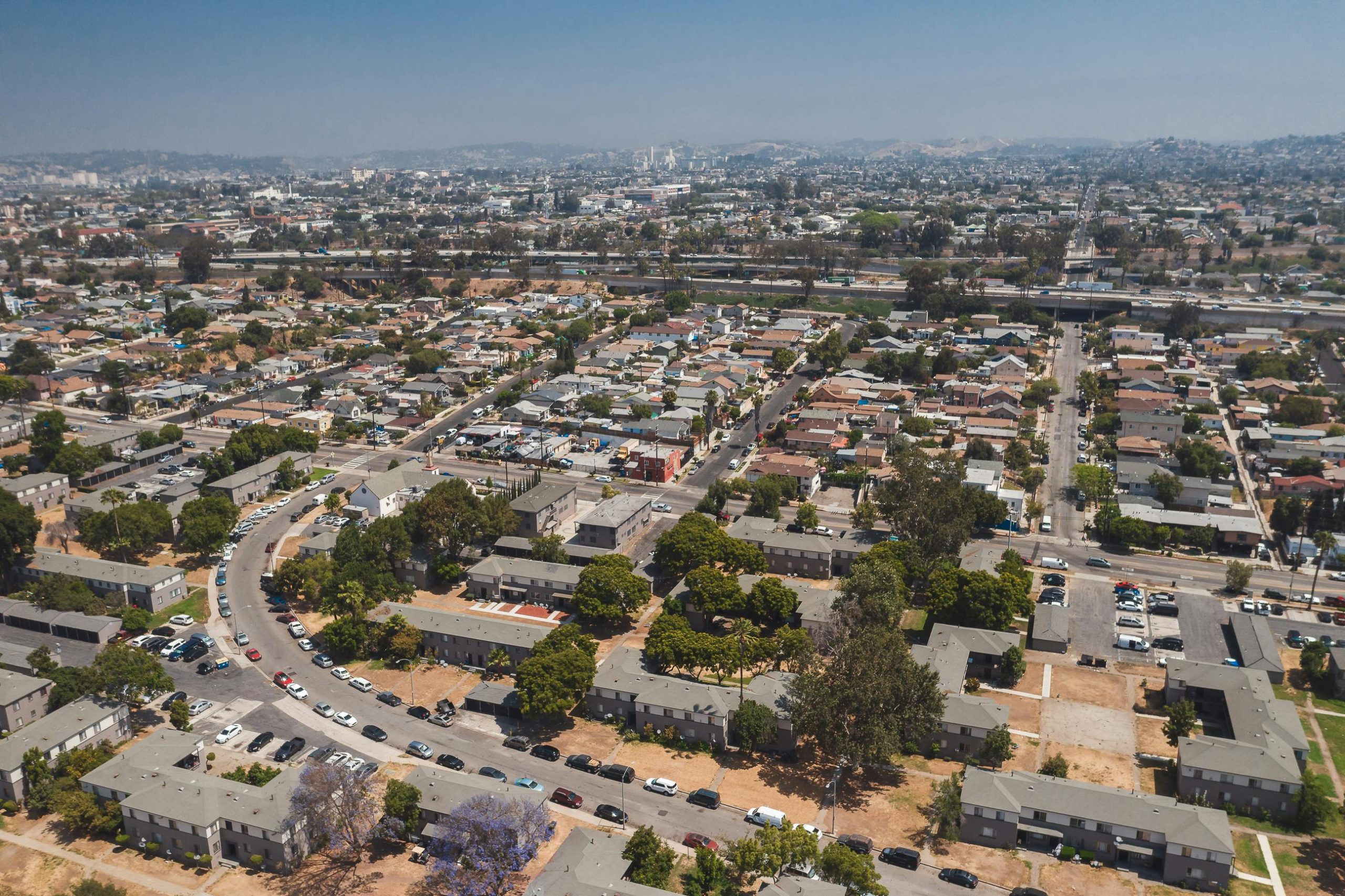
Over the past few decades, LA’s Westside has changed rapidly. Rents have skyrocketed. The median home now costs over 12 times the median household income—one of the worst ratios in the state. Our housing shortage is pricing out the immigrants, artists, workers, people of color, and young people who make the area so vibrant.
As three elected officials under 40 representing West Hollywood, Santa Monica, and Culver City, we’ve experienced this crisis firsthand. Countless young people in our cities can’t afford to build a life in the communities they grew up in, and others who made their home on the Westside because of its inclusivity are now being displaced by a housing market becoming more unfriendly every year.
For decades, West Hollywood has been a refuge for LGBTQ+ people who couldn’t live openly elsewhere, and both Santa Monica and Culver City were home to large working-class communities. But today’s housing costs are pricing out many of the Westside’s young queer people, workers, Black and brown residents, and seniors hoping to retire.
The affordability crisis is hitting our queer communities especially hard. LGBTQ+ people in LA County are more likely to rent their homes –and more likely to be cost-burdened by housing – than their straight counterparts. Queer people are twice as likely to have experienced homelessness within the past five years. For trans and nonbinary folks, the difference is even more stark. 25% of trans and nonbinary people in LA County are currently unhoused compared to 1% of the general population.
We understand that the housing shortage has been a direct result of decades of policy failures in our cities – and it’s beyond time we finally address it with urgency. If we want the Westside to remain a welcoming place –not just for the wealthy, but for everyone –we have to make it possible for more people to live here. That means building more homes.
Enter SB 79, a bill under consideration in the state legislature that would make it legal to build small apartment buildings near major transit stops. It’s desperately needed across LA —but especially in communities like ours, where access to cleaner air, strong schools, and good jobs should be available to more than just long-time homeowners and the wealthy.
Too many neighborhoods around LA’s transit stations are still reserved exclusively for single-family homes, even as taxpayers have invested nearly $80 billion in expanding our public transit system. That keeps housing costs sky high and prevents working families from living anywhere near them.
The result is both unjust and inefficient: underused transit, supercharged housing prices, and the workers our city relies on being subjected to hours-long commutes.
It doesn’t have to be this way.
We know that when there’s housing near transit, people use it. At stations like MacArthur Park and Wilshire/Vermont—which are surrounded by apartments—tens of thousands of riders board each day. And when we reduce car dependence, we also reduce pollution: climate experts estimate that adding homes near transit can cut climate-warming pollution by up to 31%.
Some worry that new housing causes displacement. But history and research show the opposite. When we don’t build enough homes, demand spills over into older, more affordable neighborhoods — driving up rents and pushing low-income renters out. By making room for more people, we’re actively reducing pressure on existing tenants.
On the Westside, we’ve fallen behind. We’ve created tens of thousands of high-paying jobs, but built far fewer homes; indeed, the populations of Santa Monica, Culver City, and West Hollywood haven’t grown meaningfully in over 50 years. That stagnation, driven by restrictive zoning, has priced out all but the most affluent.
SB 79 gives us a chance to change course.
This is about more than zoning. It’s about who gets to live here and what kind of communities we want to be. Are we comfortable becoming a place of diminishing diversity, where only the wealthy can belong? Or can we foster places where teachers, nurses, service workers, artists, LGBTQ+ people, and young families can still build their future?
We’re proud to represent cities committed to tackling this crisis head-on. With SB 79, our state will take a major step toward a more affordable, inclusive future.
Chelsea Lee Byers is the Mayor of West Hollywood, Jesse Zwick is a Santa Monica City Councilmember, and Bubba Fish is a Culver City Councilmember.
Commentary
Love in the time of net worth: The Geffen-Michaels mirror and the myth of pure intent
David Geffen and Donovan Michaels’ split is making waves, but the real story isn’t about scandal – it’s about the uncomfortable truths of love, power, and mutual arrangement.
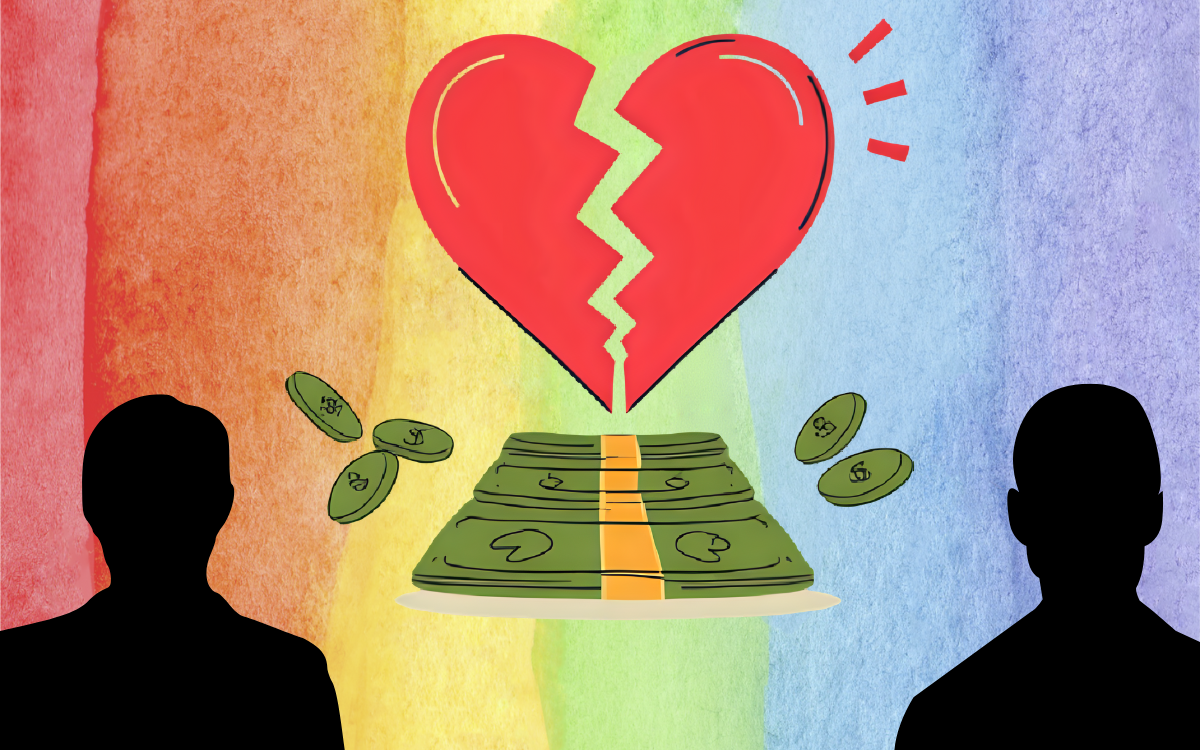
Recently, the gay internet was abuzz with the news that entertainment mogul David Geffen, 82, and his tad bit younger husband, model Donovan Michaels (né David Armstrong), 32, were splitting. It was the breakup heard around the mega-yacht docks from the waters of Fort Lauderdale to Marina di Capri, from tweet to shining tweet.
Geffen is, inarguably, one of the most powerful entertainment titans of the last half-century – a music kingpin, Broadway backer, and billionaire art collector. Michaels, Geffen’s husband for two years but together for nine, came from a background that couldn’t be more different: foster care, survival, and, eventually, modeling and escorting. The two first clocked each other on Seeking.com (previously, SeekingArrangements.com), where they each sought an arrangement that benefited both parties, each with their very different yet historically compatible motives.
Now that the union is dissolving, the backlash has come hard and strong. Geffen is being painted as the predatory puppeteer, quite possibly viewing his child of the sugar as a crystal-cut and curated addition to his art collection. Michaels, meanwhile, is being labeled a gold-digging hustler. So subtle the internet is…
But providing such defamatory, diminutive, and, quite frankly, two-dimensional commentary on the recently divorced is too easy. Perhaps we can approach Geffen and Michaels’ nullification of nuptials with a touch more compassion and understanding. So many facets to consider, so little time. Let’s dive in.
Of course, the age-old “trophy boy” trope has been given a facelift here. Overdue? Maybe. We have seen this dynamic time and time again. An older, wealthier daddy (or grand-daddy) shacks up with younger, shinier beau with cheekbones to die for. Both parties involved are hungry in their respective avenues. Comparable instances, however, occur in the straight sphere quite often and we barely bat an eyelash at it. Leonardo DiCaprio swaps out twenty-something year old models like iPhones, resulting in little more than a meme or twelve that he laughs along with. Others win elections.
But when a billionaire butt-connoisseur “friend of Dorothy” does it? Oh no, a scandal. Of course, there’s truth to the concern. Geffen, worth over $7 billion, is at that level of wealth that distorts reality, intimacy, and so, so much more. Michaels, on the flip side, was granted access to a world he wanted into and (hopefully) stepped over the glistening threshold willingly. The question isn’t “Did he know what he was getting himself into?” It’s “Are we prepared to admit that mutually beneficial arrangements are, in fact, also ‘real’ relationships?”
Yes, there’s a 50-year age gap. Yes, that’s pretty far out. But let’s be real for a second – May/December pairings are far from new. What’s intriguing this time around is how judgment shifts when the couple is both same-sex and interracial. A touch of the Meghan Markle effect with a queer twist at play? One can only wonder. Had Geffen been a straight mogul shacking up with a 30-something pageant queen from who-knows-where in the Midwest, folks would still gossip, no doubt, but there’d be less performative outrage and less cultural micro-dissection.
Is it empowering or exploitative? It is silly to believe that only one is possible here. Could it not be both transactional and emotional? The public is far too obsessed with seeing things as black and white, predator and victim, groomer and opportunist, day and night. On the contrary, reality rarely functions in this binary fashion. Perhaps Donovan found safety, luxury, and more in their relationship. Geffen likely found beauty, admiration, and companionship he didn’t anticipate finding as an octogenarian. The relationship might’ve had its roots in a good ol’ transaction, but maybe it evolved into something more emotionally complex, not to mention legally binding.
It was the lack of prenup that likely fueled the headlines and had people clutching pearls. But if we drop the tabloid tone, it’s worth noting that Michaels offered Geffen the bulk of his twenties and gave his energy to a relationship that asked him to show up emotionally, socially, and (reportedly) carnally. This begs the question, if one spends nearly a decade in someone else’s gold-gilded ecosystem, should they not walk away with something to say for it?
A settlement in this case is not necessarily opportunistic in nature. It is back pay for time served in the multi-billion dollar empire of Bev Hills royalty. Whether that includes a Malibu house, a Warhol print, or just financial breathing room, don’t hate the player. Nine years in Geffenland is practically tenure.
The reality is, partnering purely for love is a relatively modern concept. For the grand part of recorded history, people were motivated into partnership by status, protection, land, and survival. Romance is a Disney-fueled concept barely older than modern plumbing. The word lust predates the word love, and frankly, so does practical partnership.
If anything, Geffen didn’t hide the terms. He made the offer. Donovan accepted. And both benefited. That is, until the arrangement got blurred with real feelings, real power, and real legal exposure. That’s not scandalous. That’s just human nature at its most raw.
Geffen’s legacy has always been about control. He’s curated everything: from record empires to MoMA board appointments to multimillion-dollar art installations. So what happens when the most uncurated element – his relationship with Michaels – doesn’t quite follow the script he had drafted in his mind?
Look, is Geffen a hoarder of wealth in a world where millions go hungry? Unquestionably. Is he an avatar of late-stage capitalism’s grotesque gap between rich and poor? Most def. But when it comes to his relationship with Michaels, Geffen’s heart, however warped by luxury and excess, seemed to be authentically engaged. He didn’t treat Michaels like single-use plastic. He married him. No prenup. And for someone whose entire life has been about contracts, that’s more than a gesture, it’s a leap of faith. Maybe even trust? Maybe…
So give the poor ol’ queen a break. He hasn’t done anything new. Except, perhaps, look out for the well-being of a sugar child he fell deep and hard for. Listen, I get it. It’s messy. But let’s not pretend it isn’t also deeply, heartbreakingly human.
Geffen will be fine. I have a hunch he has his student loans paid off. Michaels? Hopefully, he will be too. If not today, then eventually. He’s young, sharp, and, fingers crossed, a soon-to-be billionaire. Whatever he walks away from this with, he’s already beaten the odds stacked against a dude with his upbringing.
And the rest of us? We should stop treating their split like a morality play and start treating it like a mirror. These kinds of relationships – cross-class, cross-race, cross-power – are all around us every day – just with less TMZ coverage. The only difference is Geffen and Michaels gave it a name and gave us a front-row seat to see what happens when affection meets arrangement at the icy pinnacle of the 1%.
Three cheers to Mr. Geffen for allowing his heart – and his pocket – to take a leap of faith and embark on a new romance in his golden years; and three more for Michaels, who possesses the wherewithal to advocate for himself and his needs. In a day and age where tuning into the news is an almost constant reminder of the mess that is humanity, it is a joy to know that a foster child can one day become a billionaire. Talk about a Disney ending.
Viewpoint
I’m a queer Iranian Jew. Why I stand with Israel during this conflict
‘Hands Off Iran’ movement is erasure, not solidarity
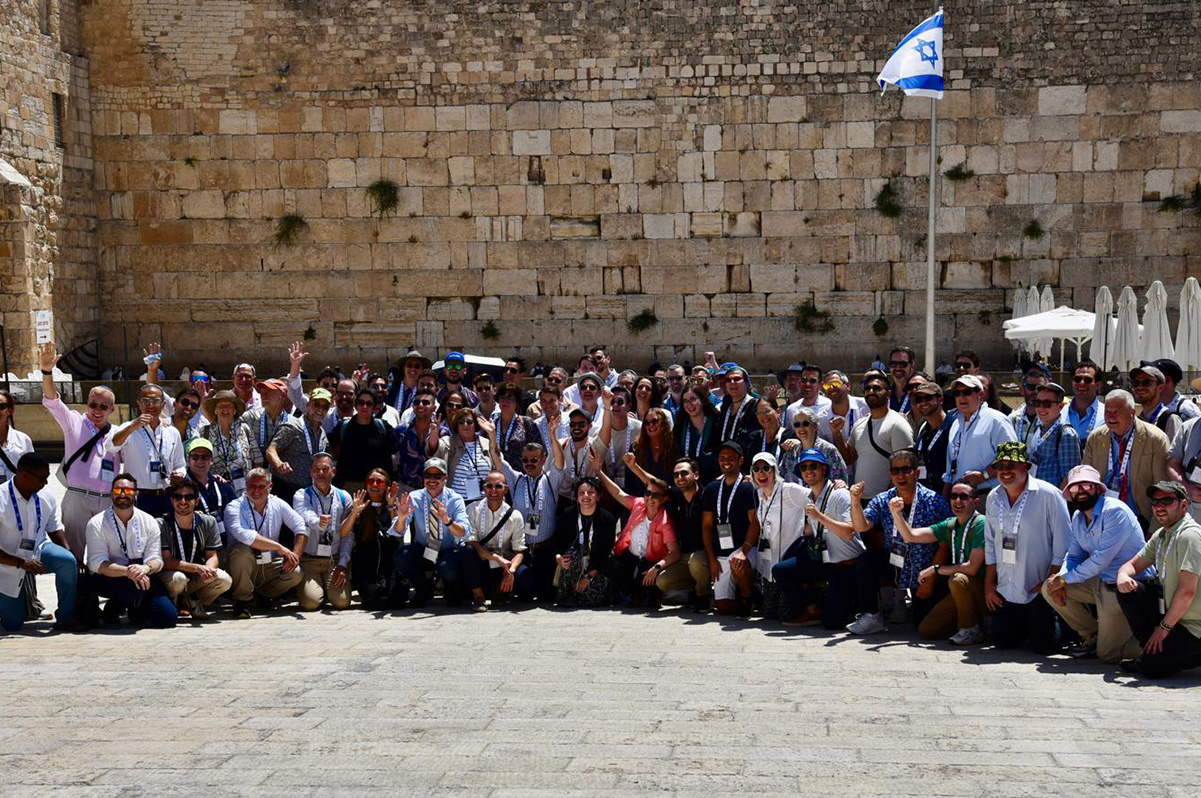
The sirens cut through the night, jolting me from sleep. My heart pounds as I lie in bed, listening to the explosions outside. I don’t have to run — my Airbnb bedroom is a “mamad,” a reinforced bomb shelter built into the apartment. Though the windows are sealed, I can feel the building shake with each blast. This is my reality now.
I arrived in Tel Aviv just before the escalation with a delegation of North American LGBTQ leaders. We came to stand in solidarity with Israel’s LGBTQ community, which has increasingly been isolated by the global queer movement. After the delegation’s five-day mission, I had planned to stay an extra week. But on my first night here, the war broke out.
Despite the fear and chaos, I’m proud to be here. While I’m not a permanent resident of Israel — I live in Los Angeles, home to the largest Iranian Jewish community in the U.S. — I feel like I’m exactly where I’m meant to be. I work in both Iranian and Jewish advocacy spaces, and being here during this pivotal moment is an act of presence, of witness, and of resistance.
The adrenaline of seeing Israel strike back against the IRGC gave way to the sobering realization: I am in a war zone. But I know I’m safer here than I would be in many other places — because Israel protects its people. With shelters. With missile interceptors. With warnings. With a government that values civilian life.
In Iran, people don’t have that. The regime in Iran — and I use that term deliberately, because the regime is not the people — cut off internet access to prevent civilians from receiving IDF warnings before strikes. They wanted maximum casualties. They wanted suffering. They wanted images to manipulate. The same regime that imprisons, tortures, and executes LGBTQ people. The same regime that stripped my family, and millions of others, of their home.
So, when I heard the same anti-Israel activists who have spent the past 20 months calling to “globalize the Intifada” — a clear genocidal chant — adopt the new catchphrase “Hands Off Iran,” my heart sank. This is not solidarity — it’s erasure. These people defend the very regime that forced my parents to flee, tearing our family apart.
Romanticizing the Iranian regime with protest signs and slogans isn’t just tone-deaf. It’s prioritizing aesthetics over truth, trend over substance, and optics over people. It’s especially painful when I see it coming from my LGBTQ peers.
Growing up queer in the Iranian Jewish community during the ’80s and ’90s wasn’t easy. It was LGBTQ spaces that taught me how to stand tall in my truth — how to live authentically and reject shame. But now, those same spaces often turn their backs on me because I’m a Zionist, a widely misunderstood movement which simply calls for Jewish self-determination.
The hypocrisy of the current anti-Israel rhetoric is glaring. The “Hands Off Iran” movement is misguided, providing cover for a regime that tortures its citizens. Yet these activists were nowhere to be found during critical moments like the 2022 “Woman, Life, Freedom” uprisings, when Iranian women risked their lives burning their hijabs in protest. After Mahsa Amini was murdered simply for showing a little hair, those cheering “queers for Palestine” said nothing. This silence in the face of tyranny is not progressive — it’s dangerous.
For me, this conflict is not theoretical — it’s personal. I’ve witnessed firsthand how the Iranian regime targets LGBTQ people, religious minorities, and women. In Israel, I’m free to be who I am — a queer Iranian Jew. If we fail to stand with Israel, we fail to protect the values of freedom, human rights, and dignity. Israel is more than just a country — it’s a refuge for people like me, and it must remain that way.
As I write this, a fragile ceasefire is in place. But even with the quiet, the clarity remains. Israel is more than just a nation. It’s a refuge. And it’s worth standing up for — not because it’s flawless, but because it’s real. And because without it, people like me — queer, Iranian, Jewish — would have nowhere to turn.
Matthew Nouriel is a digital producer at the Tel Aviv Institute, Community Engagement Director at JIMENA, and a queer Iranian Jewish activist. He lives in Los Angeles.
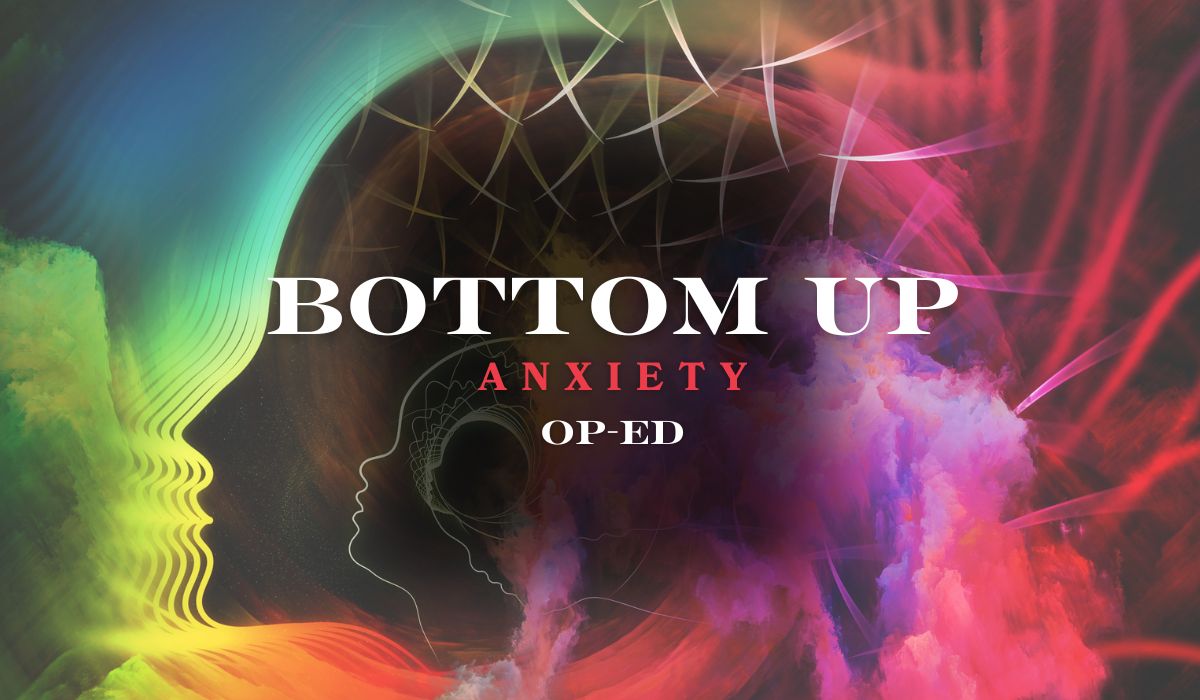
“There’s nothing wrong with you, you’re just built different. Like a Ferrari,” said my cardiologist during my latest visit.
I laughed.
He went on to explain my test results and elaborate on his analogy. But first he asked me a question I thought was completely unrelated.
“Are you an anxious person?
“No doubt about it,” I answered.
At times, in my average day-to-day life I felt like I had just run a marathon and my heart was racing. When I started taking my health more seriously and got on a consistent schedule with yoga, I noticed that my heart always felt like it was jumping out of my chest. No matter what emotions I was feeling or what external or environmental factors were involved, I always felt like I was riding on an adrenaline rush. It was hard to focus on the meditative type of yoga because I always felt my heart pounding in my ears and chest.
The first stop in my journey for answers was my primary care physician who said my strong heart palpitations might just be anxiety, referring to the type of anxiety that starts with thoughts that often spiral out of control, triggering a body response such as elevated heart rate, sweating and a number of other responses.
I shrugged off her response about anxiety because I thought for sure that wasn’t it–I felt in control of my thoughts.
She referred me to cardiology just to make sure there were no abnormalities a simple electro-cardiogram couldn’t catch. After multiple cardiologist visits, I was given a heart monitor that tracked my heart rate for a specific amount of time. The cardiologist read the results of the heart monitor and said there wasn’t really anything to worry about. Something the heart monitor caught during the five-day period that I wore it, was a consistently elevated heart rate.
The cardiologist elaborated on his car-heart analogy.
“You’re a Ferrari and I’m a Honda Civic,” he said. “We both start here (motioning at a start line for a race) and when we accelerate, I stay here and you’re way over there.”
Hearing him compare me to a Ferrari, while he compared himself to a Honda Civic, was the peak of my visit.
He said that my accelerated heart rate was probably causing me to feel anxious because from the moment I awaken–I’m racing. An overproduction of adrenaline starts to build up and the reaction is then felt throughout my entire body.
Things started to make more sense.
The hyperactivity I struggled with as a child and was diagnosed and treated as Attention Deficit Hyperactivity Disorder–was that actually a misdiagnosis because in reality I just have an elevated heart rate, causing an overproduction of adrenaline?
This ‘diagnosis’ suddenly made me realize why most of my young adult years felt like a constant disaster. I have a lethal combination of a wonderfully hyperactive mind and an overproduction of adrenaline building up in my body. No wonder I always felt tired.
After reading the results of my exam, the cardiologist prescribed blood pressure medication–something that made me feel like I had suddenly aged 50 years.
The way he explained the medication and the way that I made sense of it, was that he was laying out speed bumps so this Ferrari can go the speed limit.
“It’s going to make you feel better,” he said.
In my head, I thought “Did this man just prescribe me with literal chill pills?”
Yes, he did.
At that moment, I heard my mom’s voice in my head always saying: “Ay tú, siempre bien acelerada.” Which roughly translates to: ‘you’re always racing for everything.’
If a lack of patience is hereditary or a learned behavior, I definitely got it from my mom. My biggest self-identified character flaws are my lack of patience and need to be in control of things I feel like others just don’t do fast or well enough–enter my job as editor.
In 2023, I started seeing a psychiatrist regularly. At first, it was to deal with a painful break-up and the self-doubt, depression, suicidal thoughts and financial instability that came with the situation. Then, it turned into a long journey of identifying and facing the childhood trauma I carried on my shoulders. I knew I had to if I wanted to better the relationships in my life.
This has been quite a journey of undiagnosed anxiety. I know for a fact it’s cost me a good amount of relationships and friendships.
Though I started off with a low dose for the medication, I immediately felt a difference.
The world seemed quiet for once. Like the noise I was somehow experiencing, was suddenly turned off. I realized I was no longer hearing my heart rate pounding in my ears.
At the psychiatrist, I explained to her the new medication I started taking and she said it made sense that I experienced anxiety. According to her, it was the type of anxiety that starts in the body, with that overproduction of adrenaline and it works its way to the top, where it begins to affect my thoughts.
It’s a bottom-up versus top-down approach to emotion generation.
At the psychiatrist, I explained to her the new medication I was prescribed and she said it sounded like what I was experiencing, sort of aligned with bottom-up emotion generation versus top-down.
According to an article on the subject, “bottom-up emotions are immediate, ingrained responses to a stimulus–such as an instant feeling of fear in response to a car pulling out in front of us. Top-down emotions are more conscious responses to the way we think about a situation–such as a feeling of anxiety after deciding that we didn’t study hard enough for a test.”
The instant response to stress is based off adrenaline. The overproduction of adrenaline from these responses causes the physiological response of a very accelerated heart rate and thus, the feeling of some sort of urgency–at all times.
I thought about something she had also said to me a few months back when we had some of our first conversations about anxiety and pre-historic human beings. If I had been an early human, she says, I would have had a better chance at survival because of that ability to sense danger. She said I would have better chances than, let’s say a less sophisticated primate, who is able to stare at a leaf for an extended period of time and not sense the tiger lunging toward them at full speed, ready for its afternoon snack.
In short, the medication I’m now on, and a vigorous cardio routine will balance me out and release the overproduction of stress and adrenaline my body stores naturally.
There is no one way to treat anxiety and there is certainly no one way to experience emotions, or the psychosomatic responses that happen as a result of stress and anxiety.
This is your reminder to listen to your body.
Viewpoint
Second Trump administration will put trans youth at further risk
American politics, culture has global impact

When Andrew Joseph White, a 26-year-old transgender author, released his third novel, “Compound Fractures,” a young adult thriller, last fall, it became an instant New York Times, USA Today, and Indie bestseller.
This book is a story about an autistic trans* boy who was dragged into a generational feud. It also mentioned President-elect Donald Trump and his influence on the working class in the American South. The popularity of this novel among young readers shows that modern day teenagers are more political than some folks from older generations expect them to be.
The novel became a bestseller in the midst of the 2024 presidential campaign and White, in his letter to readers, confessed that he wanted to give it a different intro, but had to speak about how tough it is to be a young trans* person in modern-day America.
Donald Trump on Dec. 22 confirmed the fears of A.J. White and millions of other LGBTQ folks from Z and Alpha Generations. At the AmericaFest conference, Trump promised to “stop the transgender lunacy” on the first day of his presidency. He was particularly speaking up against trans* young people’s rights, and against trans* adults’ rights to work with young people.
Donald Trump’s election also increased worries about censorship around children’s and young adult literature, especially in public and school libraries.
A new report by PEN America showed that during the 2023-2024 school year, book bans increased by nearly 200 percent, targeting not just books about gender and sexuality, but also about racial discrimination, mental health, substance abuse, and other social problems that young people are facing in the everyday world. Such bans are not just making printed books unacceptable for youth who cannot afford buying their own copies. They may prevent authors from writing new books for younger generations, which will also affect American mass culture.
Republicans throughout the U.S. for a long time have behaved more and more authoritarian toward youth. Republicans are trying to attack LGBTQ youth everywhere, erasing them from academia and implementing social media restrictions.
It is tough to be a young person in modern-day America under any administration, even without new laws. All American citizens under 18 can easily be prevented from expressing their religious and political beliefs, forced to stay in abusive environments, can be medicated and institutionalized without their consent, can be separated from their supportive community if their parents say so. Young people under 18 can also be tried in adult court, but they cannot vote or run for office.
All the decisions about their rights are made by people from the older generation.
It is legal to pay young people less for their work, and deny the right to manage their property. Young people from non-supportive families are denied any chances to have normal lives until they turn 18, or even 21. This is basically the situation in most Western cultures, but American teenagers could start to change the system with more informational freedom and support.
But now Donald Trump and his supporters are trying to make everyone believe that young people cannot have their own gender identity, do not have any rights to their body autonomy, and should not be asked about their own feelings until they turn 18. Republicans have also tried to deny young people basic knowledge about the complicated world around them, as if this knowledge could be magically downloaded into a person’s mind when they turn 18.
These dangerous trends will create a generation who is used to obeying, but not very used to thinking for themselves and trusting their own feelings. It is basically a very anti-American, anti-individualistic, and authoritarian tendency.
This tendency could have a long-lasting impact on world politics.
It is not an exaggeration to say that no other culture has had such a global impact on the way people around the world think than the American culture, and it is especially true on LGBTQ issues.
When I was an LGBTQ activist in Russia and Ukraine, my fellow post-Soviet activists spoke more about Stonewall and the AIDS epidemic in San Francisco than about the persecution of LGBTQ people in the Soviet Union. By my own experience as a person who was into LGBTQ blogging and journalism in the post-USSR; the videos, posts, features, and essays on LGBTQ issues that you could find on Ukrainian and Russian social media were either a direct translation from English or based on language that American LGBTQ activists created.
Young LGBTQ people around the world are learning to speak for themselves by watching their peer influencers on English-language platforms.
As a young transgender person from Ukraine who had never heard the word trans* until I was a teenager, I understood that I was trans* since I could remember myself. I began accepting myself only after I read more about the American LGBTQ movement.
I saw a lot of young people from Eastern Europe and the Middle East for whom Lana Watchevski became a first name when they came out to their parents, or the first person who helped them to believe that yes, they could be trans* and have a fulfilling life. Folks accepted their transgender peers because there was a transgender person in a Kardashian show. And we badly need more LGBTQ films, cartoons and books for young people, and more freedom for LGBTQ youth to find their own communities. All of this will more likely come from the U.S.
I think Americans would wonder if they find out how often I saw a situation like that — a young queer Gen Z Tatar person from a small, almost isolated Russian village — or situations when a Gen Z refugee person from Iran felt comfortable to chat about American LGBTQ culture, and use it to explain their own cultural context. American culture, and America’s online spaces are quite universal.
The same rules work for conservatives.
It is not enough that such dictators as Vladimir Putin, who mirror old American anti-LGBTQ conspiracies in his statements, say that LGBTQ ideas are dangerous for children, or conservative people all around the world began to use “groomer” rhetoric to describe people who support LGBTQ rights for young people when the pro-Trump Q-Anon movement went global. It is not just endangering LGBTQ youth worldwide, but increasing a gap in mentality between different generations.
But LGBTQ young people already know that there is something unusual about them, and they need information to figure out who they are. Americans could provide it via mass culture. It is worthy to note that Gen Z is much better at understanding the power of the internet, and American Gen Zers could literally make America greater by helping marginalized people in other countries.
Moreover, LGBTQ young people in America are speaking about their experience.
They are able to say what they need. All we need to do is listen, or we will have an international atmosphere where the new generation was raised in denial of basic rights to be themselves, and prevented from learning and thinking independently.
Editor’s note: The author uses trans* in order to be inclusive of nonbinary and gender queer people.
Viewpoint
What does Trudeau’s resignation mean for the queer community?
Be careful what you wish for
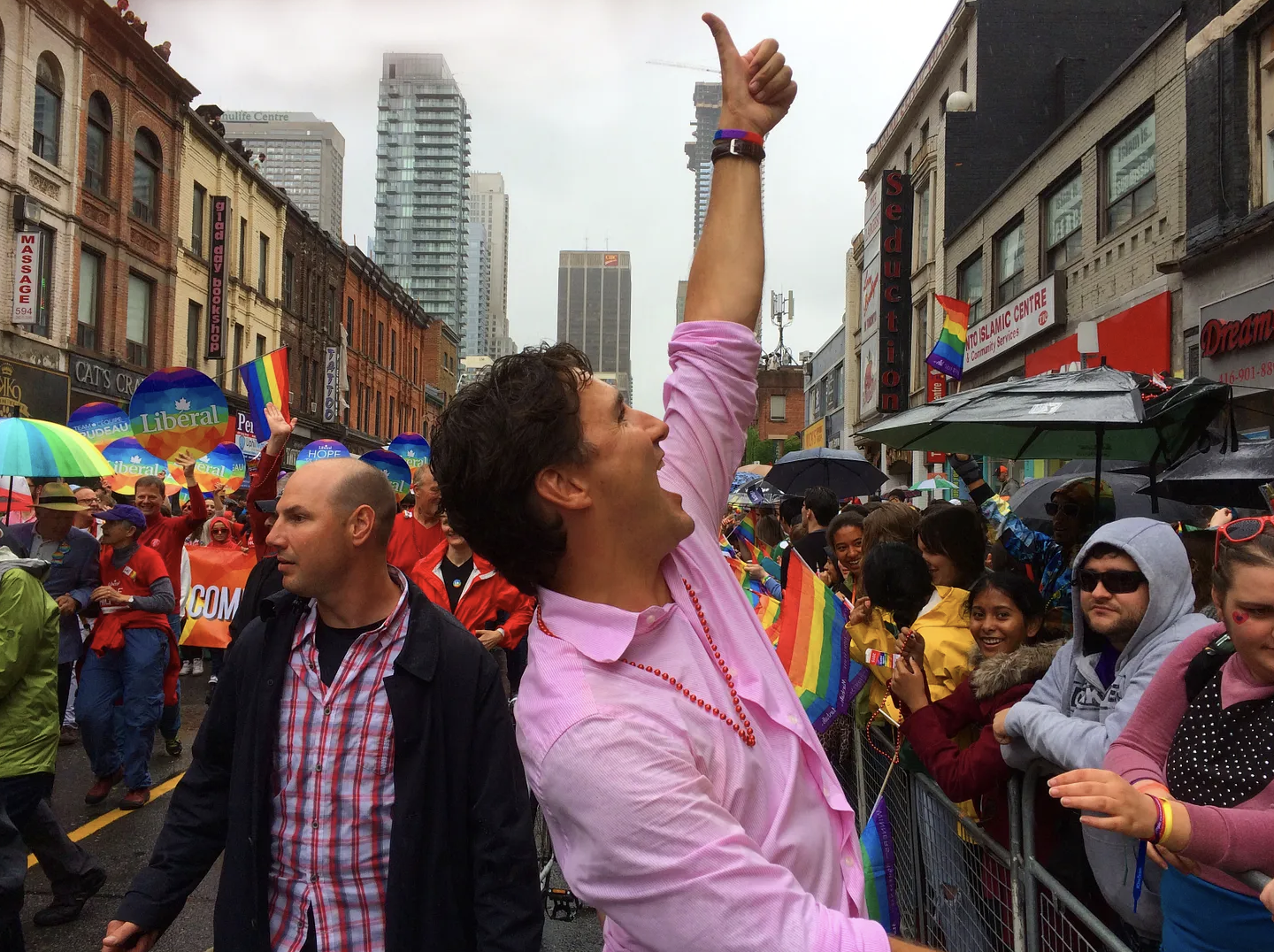
LGBTQ Global originally published this commentary. The Los Angeles Blade is republishing it with permission.
On Monday, Canadian Prime Minister Justin Trudeau announced he was stepping down as leader of the Liberal Party, and thus as prime minister as soon as the party chooses his replacement. There’s a lot to unpack about how we got here and what happens next, but it’s important to note exactly how transformative Justin Trudeau was on LGBTQ+ rights in Canada.
When Trudeau came to power in 2015, he was following nearly 10 years of rule under the Stephen Harper Conservatives. Harper’s Conservative Party was new force in Canadian politics, merging the old-school business-minded Progressive Conservative Party with the more radical and frequently explicitly bigoted Canadian Alliance/Reform Party. Harper was able to take advantage of Canada’s badly designed electoral system and fractured political left to win three elections with 36, 37, and 39 percent of the vote. Unbowed by the lack of majority electoral mandate, the Conservatives relished in forcing through their agenda without seeking support from other parties.
Harper immediately called a vote on repealing same-sex marriage, which had become national law only a year prior (the vote failed, which Harper’s defenders like to argue was the plan all along.) He immediately slashed funding to civil rights defenders who had won a string of court victories for LGBTQ+ people. Arts, culture, and tourism boards were warned they’d come under scrutiny if they funded queer groups and programs. The Conservatives blocked justice reforms like equalizing the age of consent and protecting transgender people in law.
After a decade of this shit, LGBTQ+ Canadians and progressives were exhausted and demoralized.
Trudeau swept into office in 2015 and set about immediately changing the tone. That first year was a lot of photo ops and press statements and Cabinet appointments designed to ensure that every marginalized community felt that they were represented in the new government. Trudeau even became the first prime minister to march in a Pride parade — something he did over and over in multiple cities.
Conservatives derisively called it all “virtue signaling” or and relentlessly told a certain segment of the electorate that they should be offended by it all.
But for the most part, the Trudeau government delivered, especially for LGBTQ+ people.
Two key reforms came about in its first term: An overhaul of the Criminal Code that removed a number of laws that were still used to target queer people, including a sodomy law that included a higher age of consent and a ban on gay sex if it involved more than two people. Also removed were several obscenity and bawdy house provisions that were used to harass queer communities.
The other was the trans rights bill, C-16, which included explicit protections for trans people in federal human rights law and included them as a protected class in the hate crime and hate speech provisions of the Criminal Code. It’s genuinely astounding in retrospect how much impact this bill had given how little it actually changed. Canadian courts had already ruled that trans people were generally protected under sex discrimination laws, and in any event, the federal human rights code doesn’t really cover much in Canada. The far more important provincial human rights codes had mostly been updated to include “gender identity” years before the federal code anyway.
But the passage of C-16 was also the launching pad for one of Canada’s most notorious far-right cranks, Jordan Peterson. An obviously disturbed and disgraced former university professor, Peterson gained a global following of anti-trans weirdos and incels by spreading lies about C-16. The community that formed around Peterson is now a core constituency of the Conservative Party under opposition leader Pierre Poilievre. Indeed, Peterson’s interview of Poilievre last week on YouTube was treated as some kind of Yalta Conference for cringey weirdos — and may be why Elon Musk took a sudden interest in Poilievre this week.
But that wasn’t all Trudeau delivered for the queer community.
The Trudeau government banned conversion therapy. It restored and expanded funding to civil rights groups, queer organizations, and the arts. It drafted and implemented a strategy to promote 2SLGBTQIA+ rights and inclusion across government (yeah, that the government’s official acronym.) It issued an historic apology, expungement, and compensation scheme for people who’d been convicted or fired from the public service under old anti-gay laws. It added an “X” gender option for federal ID (passports). It ended the ban on gay/bi blood, tissue, and semen donors.
Trudeau also guided Canada through an unprecedented series of global and national crises, including the COVID pandemic, the first Trump presidency, Russia’s invasion of Ukraine, an insurgency against the government (fully supported by the Conservatives), and a national reckoning with Canada’s shameful treatment of its Indigenous people.
But he was unable or unwilling to reckon with a series of major problems that have only been exacerbated by those crises: A soaring cost of living, a crumbling health care system, and a growing sense that nothing seems to “work” in Canada — from a post office that refuses to deliver packages, to parks that refuse to unlock their bathrooms, to criminals that go free because packed courts can’t hear their trials in time, to infrastructure and defense projects that drag on years beyond schedule and billions of dollars over budget.
The fact that most of these problems are under the jurisdiction of provinces that are almost entirely being mismanaged by Conservatives — sorry, the feds have to wear Canada Post — hasn’t blunted the people’s decision that Trudeau is to blame for every ill in Canada. Heck, that’s basically the Conservative slogan these days.
Trudeau probably should have stepped down a few months ago, to give the party a chance to choose a successor in an orderly fashion. Instead, he’s made himself a lame duck days before Trump takes office, threatening to annex Canada (and Greenland and Panama) through economic power, whatever the hell he means by any of that. The Liberal Party will soon announce rules for how a nationwide vote on the new leader will be held, and candidates are already jockeying into place. A new leader will have to be chosen by March 25, when parliament is recalled and the opposition is likely to force an early election, likely in mid-May.
According to current polls, the Liberal Party is cooked, and the Conservatives are poised to pull a near-sweep of parliament. Of course, it’s also possible that a leadership contest brings a fresh appealing face to the Liberals, and they’re able to recover some position ahead of the vote, whenever it is. Or Canadians will become concerned with the Conservative Party’s growing ties to Trump Republicans.
Poilievre, who cut his teeth in the Harper government as its most unscrupulous attack dog, is trying to position himself as the reasonable person who can unite and fix a fractured Canada. I have my doubts, given his entire public history. He’s also been notably palling around the worst anti-LGBTQ+ bigots in Canada and making vaguely threatening statements about banning trans women from bathrooms.
As Canadians get ready to head to the polls, it’s worth remembering what Conservatives do when they’re in power.
Viewpoint
Activists around the world offer potential path forward for American counterparts
Trump’s re-election will not stop fight for LGBTQ+ rights

Donald Trump early on Nov. 9, 2016, declared victory over former Secretary of State Hillary Clinton. My husband and I arrived in Jerusalem less than 48 hours later.
A Wider Bridge, a group that “advocates for justice, counters LGBTQphobia, and fights anti-Semitism, and other forms of hatred,” months earlier had invited us to participate in one of their missions to Israel. It was my first time in the country.
Our first meeting was at the Shalom Hartman Institute, which describes itself as a “leading center of Jewish thought and education” that seeks “to strengthen Jewish peoplehood, identity, and pluralism; to enhance the Jewish and democratic character of Israel; and to ensure that Judaism is a compelling for good in the 21st century.”
The staffer who greeted us welcomed us to Israel. He then pointed out that Benjamin Netanyahu had been prime minister for nearly a decade.
“Now you will know what it will feel like,” he said.
His comment was cold comfort to many of us who were still reeling over Trump’s victory. It is also one that has repeatedly come to mind as I continue to process the results of the presidential election and what a second Trump presidency will mean for this country, for me as a gay man, for the community that I cover, and especially for transgender Americans and immigrants who the first Trump administration disproportionately targeted.
The U.S. is certainly not the only country in which voters in recent years have elected authoritarian figures who pose a threat to LGBTQ+ rights.
Viktor Orbán has been Hungary’s prime minister since 2010. Javier Milei has been Argentina’s president since December 2023. Jair Bolsonaro was Brazil’s president from 2019-2023.
Netanyahu was Israel’s prime minister from 1996-1999 and from 2009-2021. He became the country’s prime minister for a third time on Dec. 29, 2022.
Hungary, among other things, has enacted a so-called propaganda law and effectively banned same-sex couples from adopting children since Orbán took office. Milei’s government in August closed Argentina’s National Institute Against Discrimination, Xenophobia and Racism. Bolsonaro, among other things, encouraged fathers to beat their sons if they came out as gay and said people who are vaccinated against COVID-19 are at increased risk for AIDS.

Activists who protested against Netanyahu’s proposed judicial system reforms say they would have adversely impacted LGBTQ+ Israelis. The prime minister postponed these efforts in March 2023 after a nationwide strike paralyzed the country. Israeli lawmakers a few months later approved them after opposition lawmakers stormed out of the Knesset in protest.
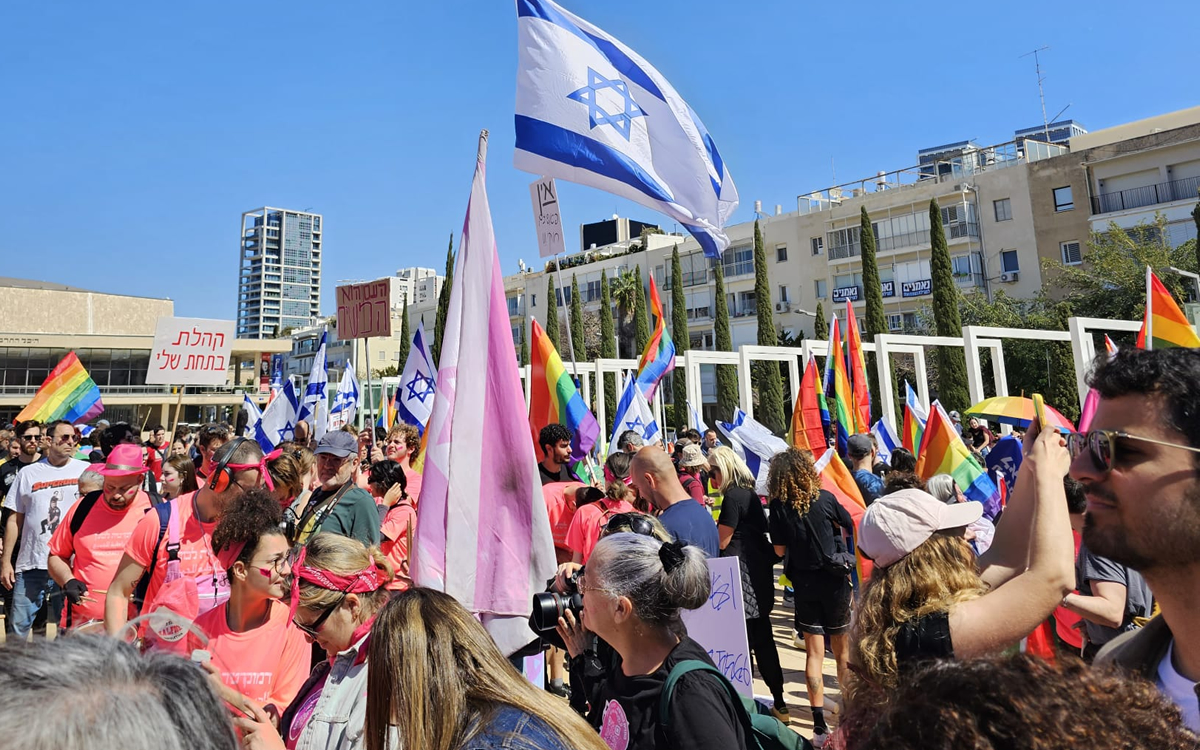
Israel, Brazil, Argentina, and Hungary are four of the dozens of countries around the world in which LGBTQ+ rights have been under attack — and the U.S. will certainly remain on this list once Trump takes office again on Jan. 20. It is certainly a frightening prospect for many in our community, but the activists in the aforementioned countries have not given up, and their American counterparts should not either.
“I’m not saying it’s not easy, but the direction is so clear,” András Léderer, the head of advocacy for the Hungarian Helsinki Committee, told me in April during an interview at a Budapest coffee shop. “They (the Hungarian government) can try to introduce setbacks. They can make life miserable, temporarily, but, you know, you just can’t go against the entire world in that sense.”
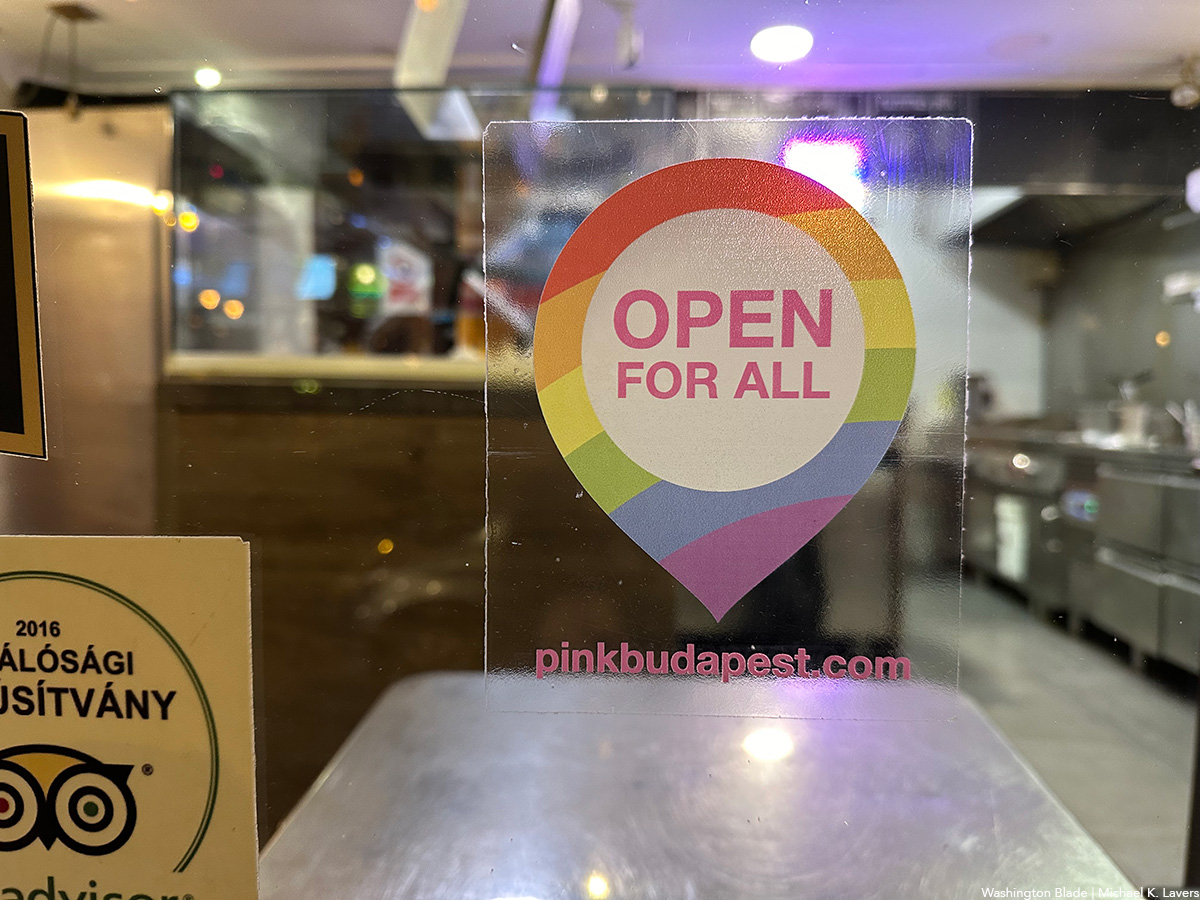
Hamas militants on Oct. 8, 2023, killed Israel Defense Forces Maj. Sagi Golan in Be’eri, a kibbutz that is near the Israel-Gaza border. His fiancé, Omer Ohana, with the support of Israeli advocacy groups, successfully lobbied Israeli lawmakers to amend the country’s Bereaved Families Law to recognize LGBTQ widows and widowers of fallen servicemembers.
“It was a big effort, and a big success,” Yael Sinai Biblash, the CEO of the Aguda, the Association for LGBTQ Equality in Israel, told me last month after she attended Golan’s memorial service in a Tel Aviv suburb.
Bru Pereira and Gui Mohallem, co-directors of VoteLGBT, a Brazilian organization established in 2014 with a mission to increase LGBTQ+ representation in politics, in response to Trump’s reelection said they and others in Brazil are “witnessing how grassroots efforts, particularly from marginalized communities, are crucial in defending LGBTQ+ rights under right-wing governments.”
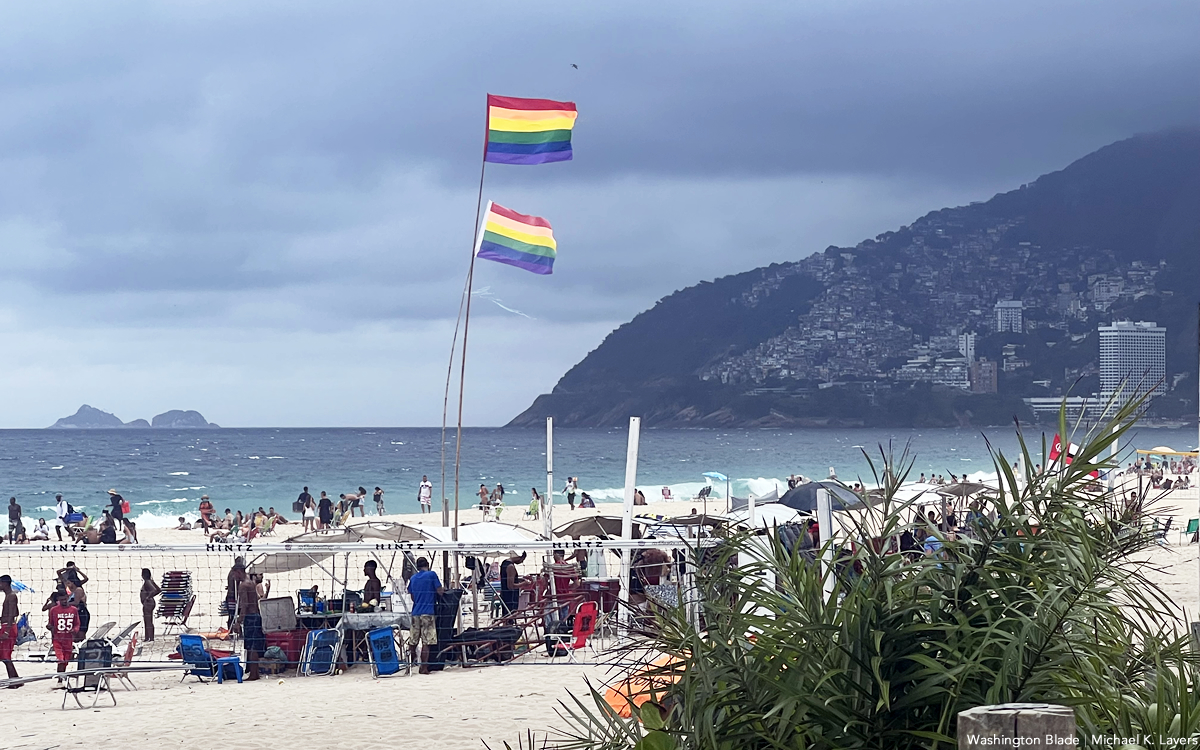
Donald Tusk became Poland’s prime minister last December after a group of coalition parties that he leads won a majority of seats in the Sejm, the lower house of the country’s parliament. President Andrzej Duda, an ally of the conservative Law and Justice party who opposes LGBTQ+ rights, remains in office as part of the governing coalition.
Deputy Justice Minister Krzysztof Śmiszek is openly gay. His partner, former MP Robert Biedroń, a member of the European Parliament.
Magda Dropek is an activist who ran for the Lesser Poland Regional Assembly in Kraków, Poland’s second-largest city, in April. Lesser Poland is among the provinces that had declared themselves “LGBT-free zones” ahead of the 2020 presidential election.
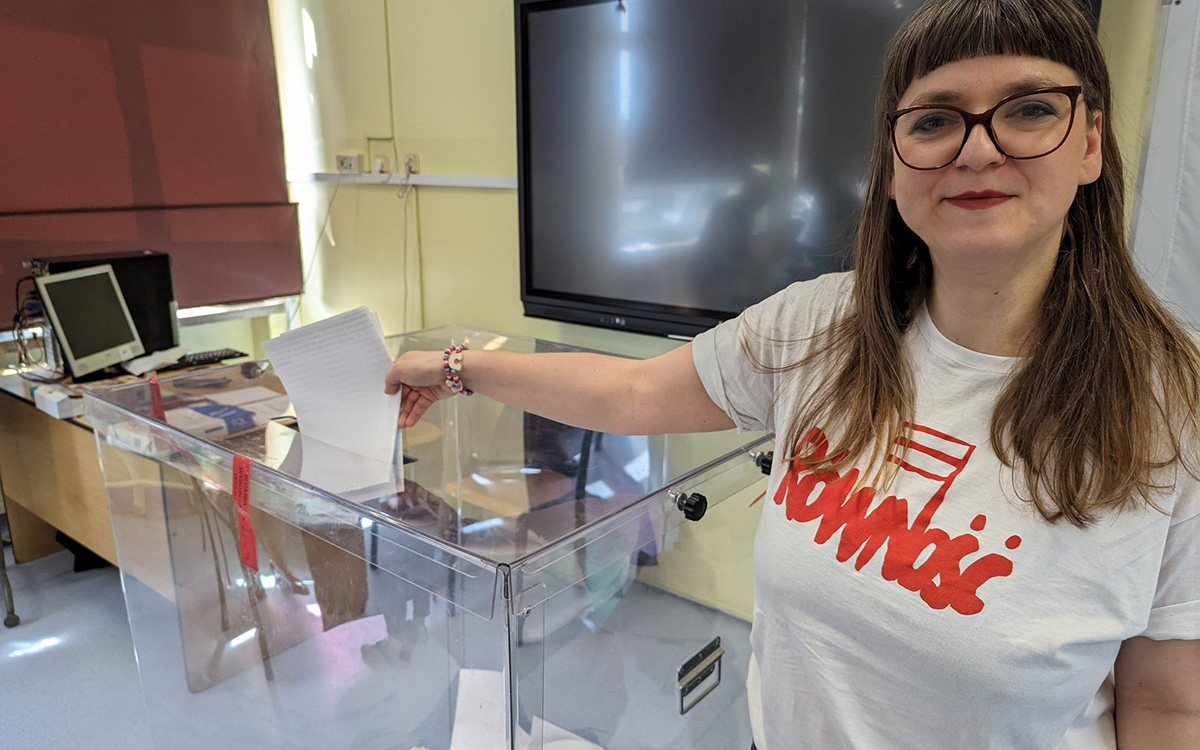
Dropek noted in her X post in response to the U.S. election results that Sarah McBride last week became the first openly transgender woman elected to Congress.
Dropek, like others, pointed out Russian President Vladimir Putin and other politicians respond to “antagonized societies” with “populism and (sacrifice) human rights.” Dropek, however, stressed the new Polish government presents an opportunity.
“What happened in Poland a year ago is still an important story that brings hope to others,” she said. “It’s a huge responsibility, but also work, because this is the time to change mentalities and educate using democratic tools. Because we’ve been coping with everything else, grassroots support and organization for so many years, you know yourselves.”
Trump leaves office on Jan. 20, 2029.
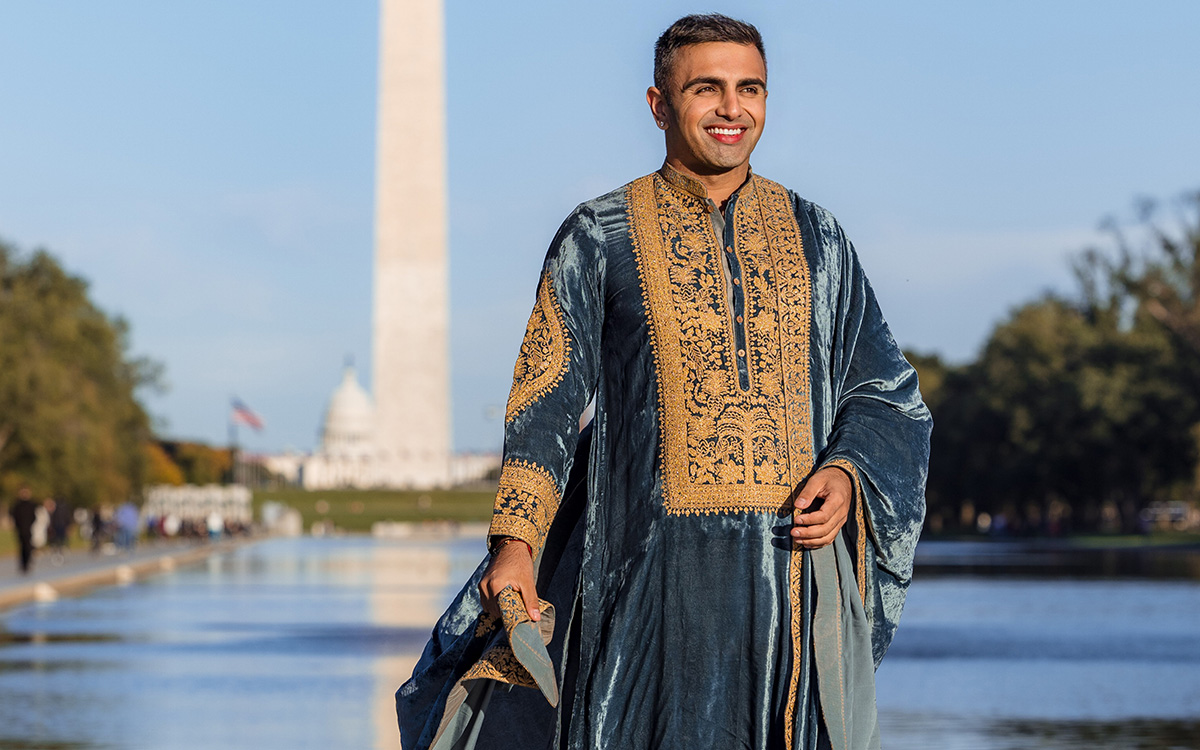
Growing up with a Christian mother and Hindu father, neither religious, Diwali and Christmas were my two favorite holidays because it meant gifts were to be received and delicious food was to be served! Hostess with the mostest, my mother would go out of her way to make each holiday special, where I felt lucky to celebrate all the American, Christian, and Hindu holidays (thinking Jesus was a Hindu God for the longest time.)
Each fall, we would help my mother, aka Indian Martha Stewart, clean our house and garnish the entrance with vibrant decor, only to welcome the VIP Goddess Laxmi — a symbol of wealth, prosperity, beauty, and power. The origin dates back to 5064 BC, the year Ram came back to Ayodhya with Sita after killing Ravana. As Ram and Sita returned back to India from Sri Lanka, the kingdom lined up and lit oil lamps to welcome their arrival. Thus the festival’s name comes from the Sanskrit word “Deepawali,” which means “rows of lights.”
Flash forward to today, where for us Indian American Hindu’s — Diwali is not just a celebration of the new year, it is the most auspicious annual event recognizing the triumph of good over evil. Over a billion people globally are joining hands while praying that their hopes, desires, and dreams come true.
Queerness in Hinduism
An outspoken teenager confused about religion, I took it upon myself to learn about all faiths and their views on homosexuality, afterlife, and the consequences of sin. In studying Hinduism beyond what my peers shared — I learned that Hinduism is the most liberal and open-minded group of teachings to exist. So liberal in fact — it is very queer. I don’t know if the Mughal conquerors or the British colonizers are to blame for India’s conservative nature — but when one digs into our scriptures — our holidays are all a celebration of mind, body, and soul.
- First Transgender Gods: Vishnu and Shiva have both been noted for transforming into female form — where Ardhanarishvara means “The Lord whose half is a woman.”
- Kama, most recognized in the Kama Sutra, is a tenet stating the desire for passion, pleasure, and emotion is a spiritual goal that is rewarded, not punished. If you are still reading this, google “Khajuraho.” The erotic art sculpted into a series of temples built around 885 CE and 1000 CE depict relations among men, women, and groups. Scholars will argue that British colonialism shaped India to be a conservative culture, shaming its history of sexual freedom.
- The tenet of reincarnation and resharing moments in the future with those in your current life is set to be believed around one’s soul, not gender. In my next life, not only may I be reincarnated as a cisgender woman — depending on how I treat others, I could be reincarnated as nonhuman — such as an insect.
If you are looking to join in the festivities — light your candles and make note of your financial and career goals. The prosperity the holiday brings is the best time to manifest your destiny, welcoming positive energy in your home. I also welcome everyone to visit a local Indian clothing store — us Indian’s love and welcome cultural appreciation.
Wishing everyone a Happy Diwali filled with light and laughter!
Viewpoint
To West Africa with love
Thoughts on Ghanaian tradition, queerness, and Western imperialism

You may know by now that Ghana’s parliament has just passed one of the harshest laws against its LGBTQ citizens in West Africa. Many advocates, activists, LGBTQ people, and allies are still trying to process why and how this happened.
During this announcement a person I’m closely tied to was in Juaben, Ghana.
They were celebrating the life and passing of their grandmother, who happens to be a Queen Mother (Juabenhemaa) of the Asante Kingdom in Ghana. It was an elaborate two week traditional ceremony with both private and public events and was attended by thousands as well as the who’s who in Ghana including President Nana Akufo Addo himself.
As a history major, a cultural enthusiast and Afro-futurist, I was excited to have first hand accounts with photos and videos of all the ceremonies and to see beautiful Ghanaian royalty and people in their decorated clothes, dress, dance, and tradition. While at the same time supporting my loved one virtually.
About four days into the two week ceremony, my person in Ghana texted me about a male dancer wearing traditional women’s clothes, wearing makeup with a stuffed buttocks. They found it intriguing and was eager to share with me. In this traditional space, it was normalized and the cultural dancer continued to even dance with other men at the ceremony.

They reported to me that some of the young anti-LGBTQ Ghanian Americans at the ceremony were disgusted and confused. One remarked ‘What? Is this ‘Drag Race now?’ as the colorfully dressed person continued to skillfully dance their traditional dance in honor of the Asante Queen Mother.
Four days later the anti-LGBTQ law passed through the parliament of Ghana, devastating LGBTQ Ghanians, advocates, allies, and diaspora.
The bill now awaits the president’s signature to be enacted.
As I read through the 36-page long document called Promotion of Proper Human Sexual Rights and Ghanaian Family Values Bill of 2021, the basis document for this legislation, it includes repetitive emphasis of resistance to foreign imposition and the maintenance of Ghanaian values, culture, sovereignty, and independence and rejection of homosexuality. The document is a combination of the efforts of various groups including Christian organizations, Muslim organizations, family rights organizations, and the traditional chiefs of Ghana.
I found it interesting that there was but one paragraph that mentioned the importance of protecting the lives of LGBTQ people. Can you guess which one group (Christian organizations, Muslim organizations, Family rights organizations and the traditional chiefs of Ghana) was solely appealing to protect the lives of LGBTQ people in the bill?
The National House of Chiefs, the group most steeped in Ghanaian historical and cultural tradition, made some attempt within the document to shield the lives of LGBTQ people from harm.
Time and time again, advocates have purported that it is indeed the hatred of queer people that is an imposition. Yet they are Christian and family value organizations funded by the right wing organizations that claim to protect local culture and values but instead create divisions that threaten the livelihoods of their Ghanaian queer families.
It begs the question, What is so western about LGBTQ people?
If we are being completely honest, the language, culture and framework is certainly western.
The expression of self was never demonized in many now erased cultures across the world but the idea and framework of queerness today is.
The LGBTQ movement is largely a western movement and culture. From the rainbow flag to its terminology. Today LGBTQ/queer is the language we use universally to describe people whose self and sexual expression is not mainstream.
During colonization, many cultural indigenous traditions were lost including the language we used to identify our family and communities. It was then replaced with Christianity used as a tool to control and restrict — as it continues to do so today.
Indigenous Native Americans are fortunate to have retained their language and some of their culture. Their language of two-spirit makes room culturally for those Indigenous people we would call queer today.
There are countless examples of cultures within West African traditions and culture that have celebrated and have space and language for their “two-spirit” people as described by the Native Americans or their “Dagara” people as described by people from the Ghanaian neighboring country Burkina Faso.
That said, as a result of our erased cultures today, LGBTQ/queer is the language and culture we have globally adopted – obviously to the ire of those who don’t quite understand their own culture.
Regardless of language, culture or foreign imposition, there is no excuse for the hatred, exclusion, and persecution of any group of people — period.
From Uganda in East Africa, Ghana, West Africa to St. Vincent in the Eastern Caribbean the sentiment remains the same where there seems to be a confusion around cultural identity and the clutching onto an idea of sovereignty in efforts to continue to resist years of colonial oppression, imposition, and trauma.
We haven’t even begun to discuss how Christianity, another colonial tool, has culturally divided us and has our societal progress in a chokehold.
However, as a futurist, it is not helpful to remain in a place of blame, anger and self pity — it gets us nowhere. This is the hand that we have been dealt and we must work in various ways to build up our businesses and to nurture and grow families, communities, and our people.
And so I offer this piece to the brave advocates across various post colonial landscapes — draw close to the cultures and identities from whence you came. Activists like Lady Phyll and Alex Kofi Donor have remained entrenched within their cultural tradition signifying that being queer identifying people and being African in identity and culture aren’t mutually exclusive.
We ought to be bold in addressing and working with external groups — the extremely tough and dangerous part of advocacy — entering churches, parliaments, universities, and being visible and contributing citizens not only within local queer communities but outside of the silos and enclaves of our safe spaces. That visibility puts a human face and personality to our cause. We must be our own politicians. Building real relationships with folks who we may not always agree with but who we may see eye to eye with on other issues. Start showing up for other marginalized groups besides our own.
And perhaps I’m blinded by the context of the advocacy done in little Barbados, perhaps it’s a safer place these days, an easier place to exercise this level of visibility … maybe.
What I do know is that we need to employ thoughtful strategy to our advocacy efforts because it was the strategy of the colonial powers that got us in this situation in the first place.
And it will be our understanding of our own people and the application of strategic thinking that will get us out.
-
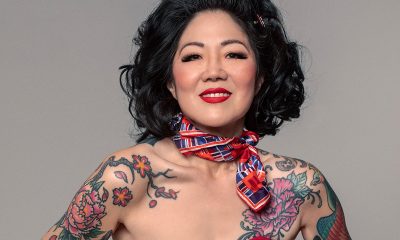
 Events1 day ago
Events1 day agoMargaret Cho joins headliner lineup for Lambda Legal’s queer comedy night
-

 Television4 days ago
Television4 days agoSay ‘Hello, Hello, Hello’ to ‘Drag Race’ winner Onya Nurve
-
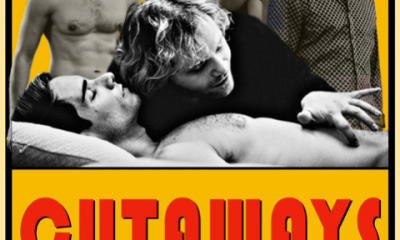
 Movies2 days ago
Movies2 days ago‘Cutaways’ and the risk queer cinema forgot
-

 Television1 day ago
Television1 day agoNetflix’s ‘The Boyfriend’ is more than a dating show
-

 Italy2 days ago
Italy2 days ago44 openly LGBTQ+ athletes to compete in Milan Cortina Winter Olympics
-

 Commentary4 days ago
Commentary4 days agoAre we addicted to yearning?
-
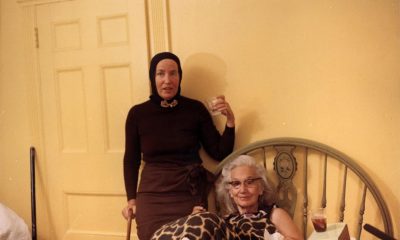
 Movies18 hours ago
Movies18 hours ago50 years later, it’s still worth a return trip to ‘Grey Gardens’
-

 a&e features13 hours ago
a&e features13 hours agoAngel McCoughtry, “Renaissance Woman”
